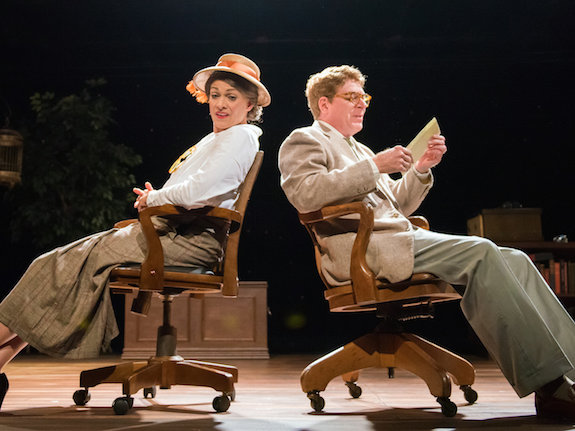Many days and evenings of live theater ask for an audience to bring both heart and head to the theater in equal measure, ready for everything from tears to fears to gales of laughter.
"Dear Elizabeth," the play by Sarah Rule that opened over the weekend at Milwaukee Chamber Theatre, is a bit of a rarity. While you may chuckle and certainly tear up at the end, the majority of your time is going to be spent with your mind being challenged and exercised.
"Elizabeth" is the story of two Pulitzer Prize-winning poets who had a 30-year affair that is not what you might think.
This smart play is truly a love story, but the story of love between friends, conducted over miles of geography and miles of intellect and practice. Like most love affairs, it is full of fits and starts, but there is a constancy to the relationship that allows it to persevere over all bumps in the road.
They were unlikely friends.
Lowell was a flamboyant poet who loved the public adulation that attended his poetry and wrote much of his work based on his turbulent personal life and experiences. He was a famous Lothario, marrying three times.
On the other hand, Bishop was a quiet and reserved, writing poetry that contained detailed observations of the world around her. She was a lesbian who carried on a lengthy relationship with Lota Soares, a famous architect from a prominent Brazilian family.
Lowell and Bishop met in 1947, and Bishop wrote to Lowell shortly thereafter, recounting their meeting and expressing her admiration of Lowell’s work. Thus began a correspondence of over 400 letters upon which the play is based.
We are met with a spectacular set designed by Steve Barnes, with two distinctly individual work spaces at each edge of the stage. In front, the stage is marked, both front and back, by actual ponds of shallow water into which both Lowell and Bishop will stand during the performance. The setting is bathed in subtle lighting, designed by Noele Stollmack, surrounding the stage with the stars, a fitting home for a star-struck friendship.
Real life couple, Carrie Hitchcock and Norman Moses, play the two poets under the direction Marie Kohler.
The play is told in the letters, with virtually no dialogue other than the words of the two poets. Their obvious facility with language allowed for letters both eloquent and plain, important and mundane, joyous and sad. There are only moments when the two appear to be in the same place at the same time, only emphasizing the crucial vitality of their pen and paper relationship
Hitchcock exquisitely captures the Bishop of a woman of standards who is beset but uncertainty in her own life and work but has a well developed sense of surety about the lives and works of others. With Hitchcock, we get the private Bishop, complete with her doubts and her search for hidden bottles of whiskey and even a sip of rubbing alcohol to dull her devils.
Moses has both the look and visage that give us a man who fights his demons with an over-the-top spirit. Lowell suffered from manic depression and spent time in hospitals for treatment and seclusion. Moses has the skill to create this character without the kind of excess you might find in a lesser actor.
The moments between these two show that friendship is a two way street. They start out with "Dear Mr. Lowell" and "Dear Miss Bishop," and nothing for a goodbye than their names. Over the years, they move to "My Dearest Elizabeth" and "With lots of love, as always."
At one point relatively early in their relationship, Moses and Hitchcock come close to an embrace, he clearly wanting to say something, she unprepared for what she might answer. We know he’s about to ask her to marry him, and we know she is uncertain how she may respond.
Later, Moses writes to her: "Asking you might have been for me, the one towering change, the other life that might have been had."
This play demands restraint. And for the most part, Kohler keeps a tight rein on things. There are occasional slips, such as when Bishop opens a whiskey bottle and guzzles it. Rather than get a response at the sorrow of her alcoholism, the audience responded with chuckles. The act needed to have some doubt and hesitation in order to achieve its full impact.
But those tweaks are minor. There is a remarkable intellect to this play, and Kohler has not run from it. She has not looked for histrionics, although there were moments when she might have suggested her actors let it go. Nobody really lets it go in this production, and that is as it should be.
"Dear Elizabeth" runs through Oct. 18 and information on showtimes and tickets is available here.
With a history in Milwaukee stretching back decades, Dave tries to bring a unique perspective to his writing, whether it's sports, politics, theater or any other issue.
He's seen Milwaukee grow, suffer pangs of growth, strive for success and has been involved in many efforts to both shape and re-shape the city. He's a happy man, now that he's quit playing golf, and enjoys music, his children and grandchildren and the myriad of sports in this state. He loves great food and hates bullies and people who think they are smarter than everyone else.
This whole Internet thing continues to baffle him, but he's willing to play the game as long as OnMilwaukee.com keeps lending him a helping hand. He is constantly amazed that just a few dedicated people can provide so much news and information to a hungry public.
Despite some opinions to the contrary, Dave likes most stuff. But he is a skeptic who constantly wonders about the world around him. So many questions, so few answers.







